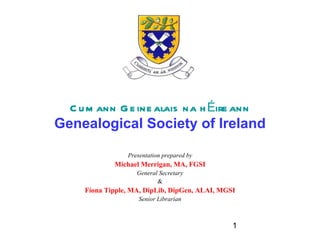
Genealogical Services in Ireland - 07 Sept. 2011
- 1. C u m ann G e ine alais na h Éire ann Genealogical Society of Ireland Presentation prepared by Michael Merrigan, MA, FGSI General Secretary & Fíona Tipple, MA, DipLib, DipGen, ALAI, MGSI Senior Librarian 1
- 2. Introduction to the Society • Founded in 1990 in Dún Laoghaire • Adopted present name in 1999 • Incorporated in 2000 • Received a Grant of Arms in 2001 • Nominating Body for Seanad Éireann • Registered Educational Charity • Irish and international membership 2
- 3. Objective & Activities • To promote the study of genealogy, heraldry and social history as open access educational leisure pursuits available to all ... through • 12 Lectures and 11 discussion groups • Publications – monthly, annual & occasional • Archive & Research Centre – An Daonchartlann • Courses – weekend genealogy courses • Group projects – Irish DNA Atlas & others • Advocacy – legislative matters & accessibility 3
- 4. Public Policy Principle • At its 1997 AGM the Society adopted the important ‘Principle of Public Ownership and Right of Access’ to our genealogical heritage. • This is now accepted as the bedrock of good practice by progressive institutions throughout the State. 4
- 5. Legislative Issues Advocacy on legislative matters relating to genealogical records and heritage issues since 1992 and covering circa 20 Bills, including: Statistics Act (1993) Heritage Act (1995) National Cultural Institutions Act (1997) Civil Registration Act (2004) Genealogy & Heraldry Bill (2006) National Cultural Institutions (Amendment) Bill (2008) Statistics (Heritage Amendment) Bill (2011) Proposed integration of NAI, IMC and NLI and many others. 5
- 6. Legislative Programme • The Society welcomes the inclusion in the Programme for Government of commitments on the release of the 1926 census and the reform of the delivery of heraldic services. • The National Archives Act, 1986 and the National Cultural Institutions Act, 1997 require updating to meet the current and future requirements of the institutions. • Opportunity for the legislative integration of the NAI, IMC and NLI in a new National Cultural & Archival Institutions Bill which maintains these bodies as separate institutions. 6
- 7. Genealogy – Resource or Product? • The fundamental question! • As a product genealogy benefits the few – those who can afford to buy it and those selling it. • As a national resource genealogy has the potential to benefit important sectors of the economy and many communities throughout the country in a sustainable manner. 7
- 8. Sustainable National Resource • Our genealogical heritage is part of what we are as a people and it’s the cherished inheritance of over 70 million people throughout the world. • Genealogy is the ‘gateway’ or ‘introduction’ to Ireland and its culture, heritage, goods and services for millions of potential customers, clients, visitors and investors around the world. • Genealogy is a sustainable national resource. • To successfully compete with the growing trend towards ‘pay for view’ genealogy, we should concentrate on developing and marketing internationally accessible ‘free to view’ on-line genealogical resources. 8
- 9. Public Access • The ‘Principle of Public Ownership & Right of Access’ to our genealogical heritage is fundamental. • Free public access must be maintained to all genealogical records held by the State, Local Authorities and State funded institutions. • An enlightened and progressive approach to providing free public access to historic records such as the Land Commission records is essential. • The paper and computerised genealogical records of the State funded network of Heritage Centres should be transferred to the custody of the County Librarians in each area. 9
- 10. The Irish Diaspora • Seventy Million and growing! • The ‘Principle of Public Ownership & Right of Access’ extends to our diaspora. • The promotion of an awareness, appreciation and knowledge of Ireland’s genealogical heritage amongst our diaspora will create a sustainable affinity and a purposeful connectivity with Ireland’s past and present. • This ‘gateway’ to Ireland should not be obstructed by virtue of cost – access to their genealogical heritage must be free of charge to maximize its appeal, its sustainability and its potential for development. 10
- 11. National Policy Required • The delivery of genealogical services by the State institutions and State funded NGOs is fragmentary and often simply an adjunct to core functions. • Genealogy is a valuable national resource and should be developed, managed and promoted accordingly. • Designation and preservation of genealogical records, coordination in the delivery of services, maintenance of standards, and the commitment to public access is essential. • A national advisory body representing all stakeholders to assist in the formulation of a National Policy on the Provision of Genealogical Services and to advise on its implementation. 11
- 12. An Bealach Romhainn • Identification of key objectives • Legislative reform – updating of 1986 National Archive and 1997 National Cultural Institutions Acts. • Identification of stakeholder partnerships / collaborations (State, semi-State, NGOs, commercial & voluntary sectors) • Establishment of implementation processes, frameworks and timetables • Source sustainable funding streams • Research, Innovation & Development – planning & strategies • Formulation of a National Policy on the Provision of Genealogical Services in Ireland. 12
